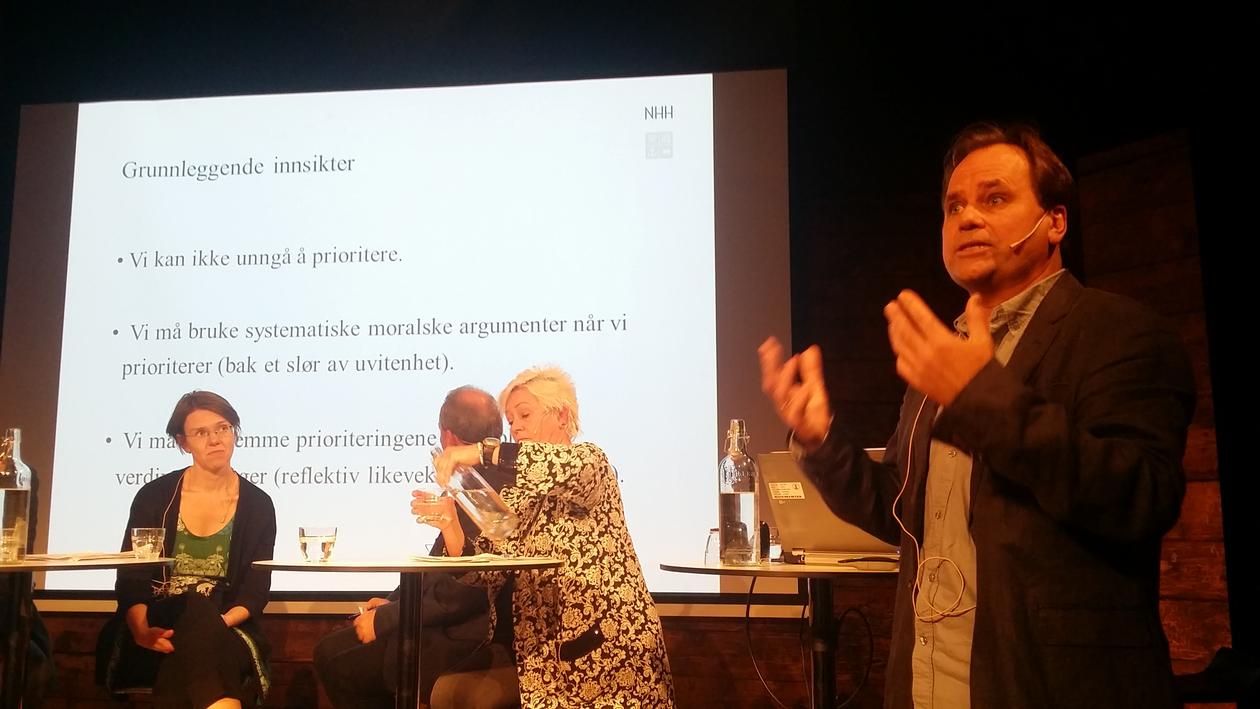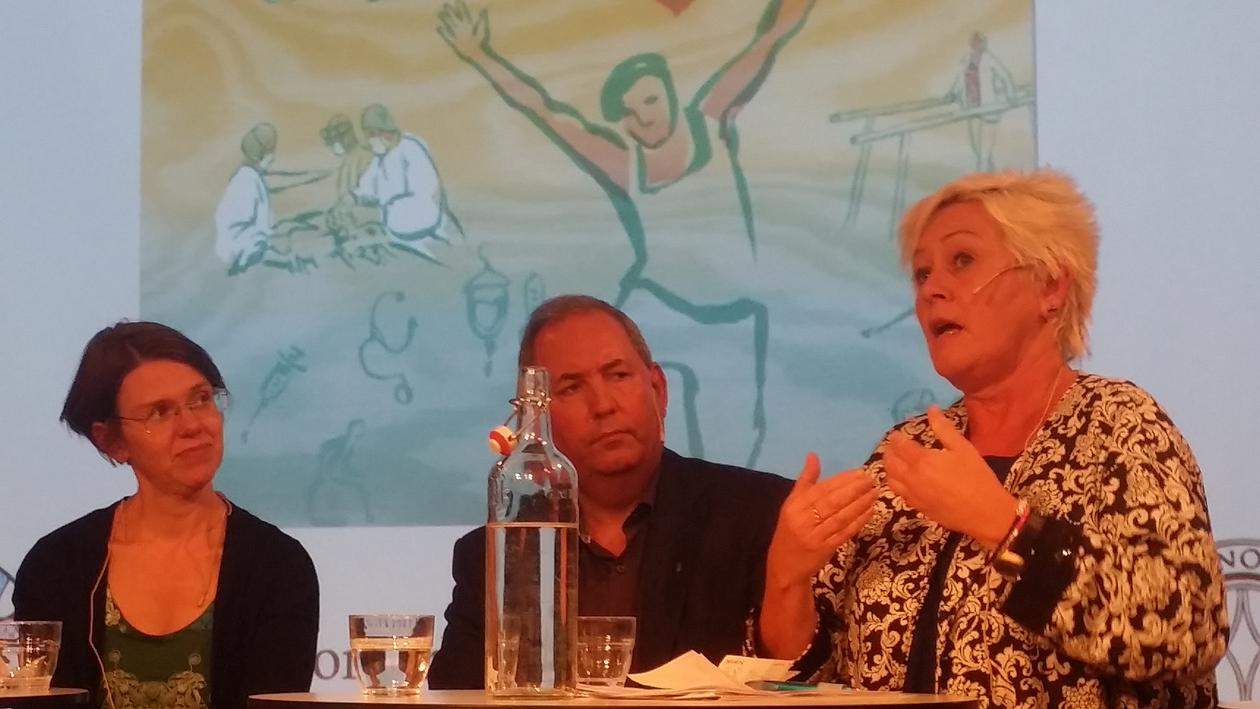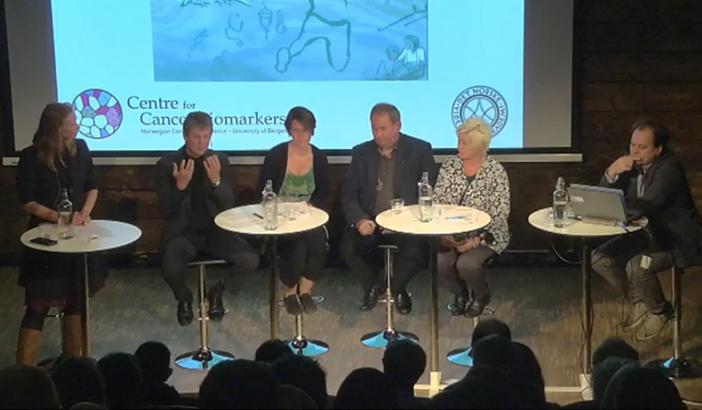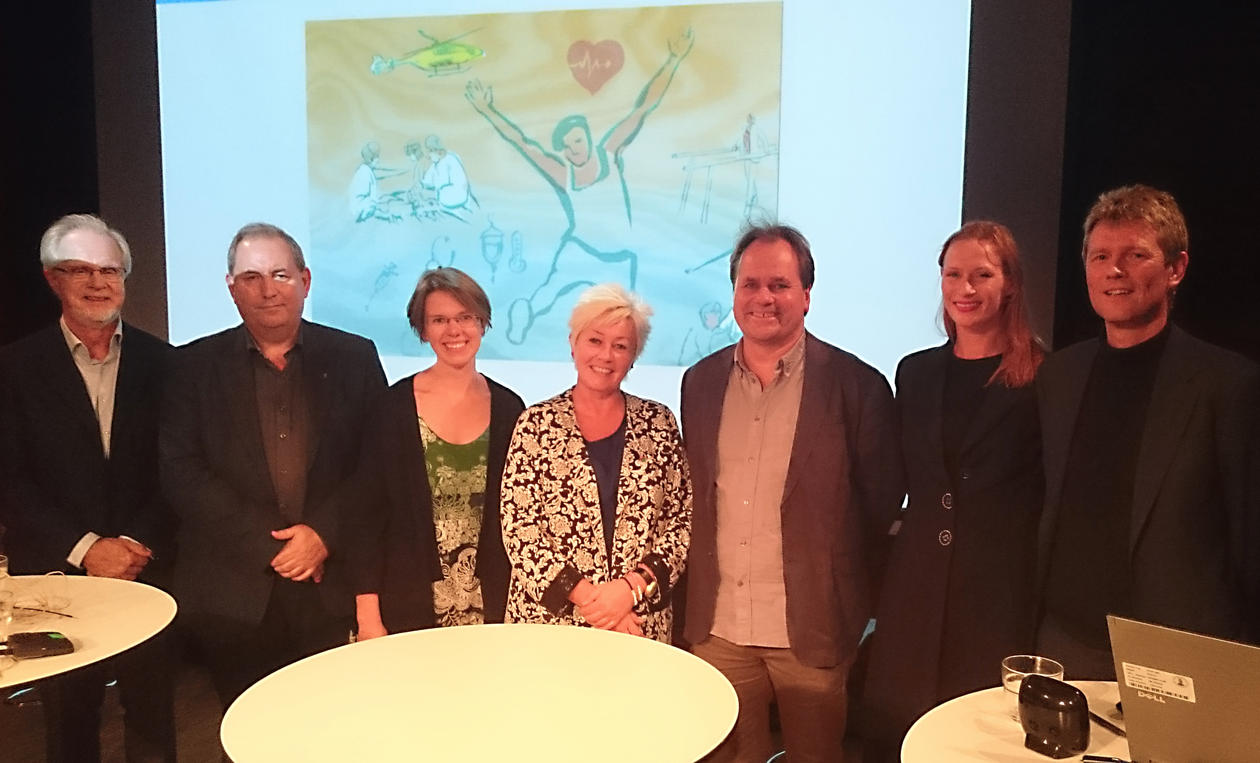Health Priorities of the Future
Perhaps we should issue a time frame on the public health bureaucracy, says CCBIO Director Lars A. Akslen, when considering the time it takes new drugs to be accepted to Norway.

Main content
Experts met October 26th in Bergen (Litteraturhuset) to debate what the future holds for Norwegian patients when meeting the national health care system. The public meeting, held by The Norwegian Academy of Science and Letters (Det norske videnskaps-akademi) and organized by Centre for Cancer Biomarkers (CCBIO), included short presentations and discussion by five expert panelists, among them CCBIO Director Lars A. Akslen. In addition Ole Frithjof Norheim, Elisabeth Ivarsflaten, Anne Lise Ryel and Bertil Tungodden joined the panel. CCBIO's own Communications Adviser Marion Solheim chaired the meeting. See the program here.
Transparency about public health priorities
The topic for discussion was "Health Priorities of the Future". The national healthcare budget is limited and we are facing decisions that concern life and death. Who should be prioritized and who must settle for the next best medicine?
Openness about the decision-making process is a relatively new thing. A Norwegian governmental expert group on public health prioritization, in 2014 submitted its final report “Open and just - priorities in the Norwegian healthcare services”. Its main conclusion is that health prioritization needs to be systematic, transparent, based on general criteria, effective and anchored in the goal of “as many good life-years for everybody, fairly distributed”. Guidelines on how to make priorities were given.
Important debate
The report caused a considerable debate in the media and among politicians. Professor Ole M. Sejersted, Vice Pres of the Norwegian Academy of Science and Letters (Det norske videnskaps-akademi) stated in his introduction to the meeting that “this debate is important as it addresses essential ethical and political issues, spans many disciplines and involves so many academic fields”. The Academy wished to facilitate a debate arena where the professionals and society can meet. This meeting is an example of such an arena.
Professor Ole Frithjof Norheim has been concerned with the priority issue for many years. He was leader of the governmental expert group on public health prioritization who submitted the report and explained about the process of elaborating the report, the complexity of the issue and the necessity of the focus on prioritization. You can read the report in full here.
People do care
Associate Professor Elisabeth Ivarsflaten from the Department of Comparative Politics at the UiB, is coordinator for Norsk medborgerpanel, a large-scale survey among Norwegian citizens on attitudes to key issues in Norwegian society and politics. The survey showed that health is a very important issue for people, and that the public is divided on the question whether the resources used on health are sufficient. Nevertheless, there is more or less a general agreement that public healthcare needs to consider costs and benefit when choosing treatment methods. Public opinion was also important for the Norheim report, and Norsk medborgerpanel was a collaborative partner in the work with the report.
Request from society onto science
CCBIO Director Lars A. Akslen contributed with the talk "Personalised treatment and prioritization – what can we do and what do we do?" CCBIO is conscious about the prioritization debate and the issues raised. A researcher today is asked to consider the social role and function of his knowledge before it is produced. There is a new request from society onto science: the request not only to produce knowledge but smart knowledge that can promote socially robust decision-making. This is also addressed in a CCBIO Research School for Cancer Studies course for PhD students, CCBIO903; Cancer Research: Ethical, economical and societal aspects.
Professor Akslen explained about the complexity and uncertainty of cancer and reflected upon several issues he observes in his profession and some provocative positions in his field: Should we spend public money on research of cancer types that are not fatal? What about the cost of excessive diagnostics and treatment of advanced cancer? Some cancers might in fact be so slowly growing that less treatment than given today should be considered. And then there is the long time-span from a new, effective drug is ready for use until it is approved in Norway. "Perhaps we should issue a time frame on the public health bureaucracy in addition to what has now been implemented for the hospitals, and see if they have more luck in keeping their deadline?" Akslen asked.
Targeted treatment
CCBIO's focus is to develop tools to better define which cancer cells that will spread or not, and who might benefit from which treatment. Biomarkers are such tools, which work as a biological fingerprint that can be analyzed and reported to clinicians, giving better understanding of tumours, how they spread and interact with the surrounding body tissue, and how they respond to treatment. "This is new research that might prove very important in the prioritization process", Akslen concluded.
A necessary debate
There is no question that health priorities is an issue that involves many aspects of society, involving both the medical profession, researchers, politicians and the public - and not least, the individual patient. This meeting could not solve any questions, but the evening showed that this is a very complex issue, more questions need to be raised, and transparency on how public prioritization is done is of major importance in our democratic society. The Norheim report is part of this openness, and that is a large step in the right direction.
Read more
Article in Bergens Tidende about the meeting.
Current news stories to illustrate the debate issue:
"Ja til kreftpasientar kan bety nei til andre" (Yes to cancer patients might mean no to others), Bergens Tidende 28.10.15.
"Vi har ikke tillit til at det prioriteres rett", (We do not believe in the justice of the priorities taken), Bergens Tidende 29.10.15.
"Samler inn penger til kreftkur for mamma" (Fundraising for cancer drugs to Mum), Bergens Tidende 25.10.15.
“What if I decide to just do nothing?”, Time Magazine, 01.10.15.
"Ja til supermedisin mot kreft" (Superdrug against cancer finally approved), VG, 16.03.15.



